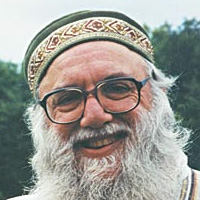
Rabbi Arthur Waskow is the director of The Shalom Center. In 2013, Rabbi Waskow received T’ruah’s first Lifetime Achievement Award as a “Human Rights Hero.” His chapter, “Jewish Environmental Ethics: Adam and Adamah,” appears in Oxford Handbook of Jewish Ethics and Morality (Dorff & Crane, eds.; Oxford Univ. Press, 2013). Rabbi Waskow is the author of 22 books including Godwrestling, Seasons of Our Joy (JPS, 2012), and Down-to-Earth Judaism: Food, Money, Sex, and the Rest of Life. With Sister Joan Chittister and Murshid Saadi Shakur Chisht he co-authored The Tent of Abraham: Stories of Hope and Peace for Jews, Christians, and Muslims, and with with Rabbi Phyllis Berman wrote Freedom Journeys: Exodus & Wilderness Across Millennia (Jewish Lts, 2011). He edited Torah of the Earth (two volumes, eco-Jewish thought from earliest Torah to our own generation). These pioneering books on eco-Judaism are available at discount from “Shouk Shalom,” The Shalom center's online bookstore.
Filter resources by Category
Filter resources by Tag
Filter resources by Collaborator Name
Filter resources by Language
Filter resources by Date Range
Contributed by:
Arthur Waskow, the Shalom Center
There it sits on the Seder plate: ḥaroset, a delicious paste of chopped nuts, chopped fruits, spices, and wine. So the question would seem obvious: “Why is there ḥaroset on the Seder plate?” That’s the most secret Question at the Seder – so secret nobody even asks it. And it’s got the most secret answer: none. . . .
Contributed by:
Arthur Waskow, the Shalom Center, Yeshayahu ben Amōts
As we move not just toward a new “year” (shanah) but toward a moment when repetition (sheni) becomes transformation (shinui), I hope we will remember the roots of Jewish renewal in the upheavals of the 1960s as well as the upheavals of the 1760s, the roots of Judaism in the great “political” speeches of the Prophets, and the teachings of Rabbi Abraham Joshua Heschel, who said that in a great civil rights march his legs were praying, and who argued again and again that “spirituality” and “politics” cannot be severed. As Heschel also said, “Prayer is meaningless unless it is subversive.” . . .

